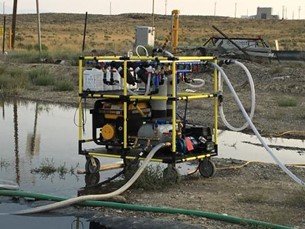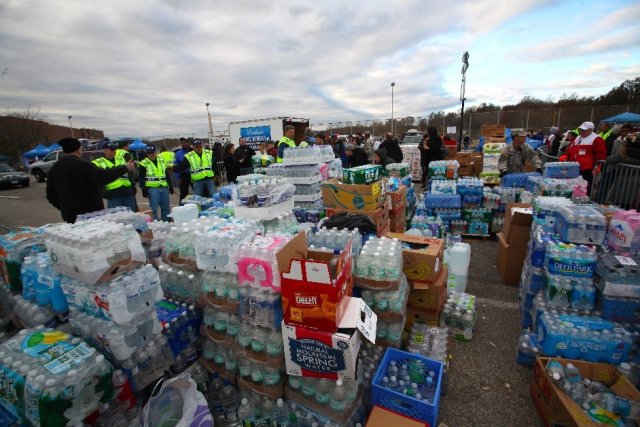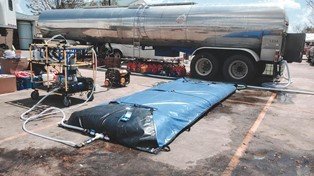EPA Researchers Partner with WaterStep to Deliver Clean Water During Emergencies
Published September 9, 2022

In the wake of disasters, many communities temporarily go under boil water advisories because they lack access to safe and clean water. A prime example is the back-to-back hurricanes in 2017 that hit Texas, Florida and Puerto Rico, flooding water systems and preventing communities from accessing safe drinking water. EPA researchers recognized the need for portable water treatment systems that could quickly and cost-effectively provide safe drinking water to affected communities following a disaster.
To address this challenge, EPA researchers partnered with WaterStep to develop a modular, mobile water treatment system known as the Water on Wheels – Mobile Emergency Water Treatment System, or the WOW cart. The partnership was developed through EPA’s cooperative research and development agreement (CRADA), a research partnership between EPA and one or more external parties, such as a university or company. EPA’s role in the partnership with WaterStep was to provide technical assistance, environmental sampling and analysis, and logistical support. Researchers also provided expertise to expand the mobile unit’s capability with additional drinking water treatment processes and disinfection research, including granular activated carbon (GAC) and LED UV disinfection best practices. WaterStep designed the mobile treatment cart and provided the engineering and fabrication.

The resulting product is not only easy to use and transport during a disaster but also reduces waste from the countless number of water bottles given out during a water contamination event. One of the first priorities for emergency responders is to get clean and safe drinking water to people. This is typically done through the distribution of bottled water. While this is an important first step for recovery, it also leads to additional debris that must be managed and disposed of after a storm. The WOW cart can be hooked up to large tanks of water that allow community members to come by and fill up containers for their own personal use. The water can be used for cooking, cleaning, laundry, and showering. It should be noted that disinfection devices – which include some components of the WOW cart - are regulated under the Federal Insecticide, Fungicide, and Rodenticide Act (FIFRA) and may also be subject to other specific state regulations.

Another alternative to bottled water that has been used in the past are large reverse osmosis machines. The difficulty with these operations is that it often requires large semi-tractor trailers to transport the machines. This could mean that communities that have had major roads washed away or areas that are difficult to access due to rough terrain may not receive the assistance they need. In addition, many of these technologies require special expertise and power to operate, which can become expensive over time. The WOW cart is small enough that it can be carried on the bed of a pick-up truck making it easier to get to areas that may be more remote. Local responders and volunteers can also be trained on how to operate the cart, which can allow for recovery operations to start faster rather than having to wait for highly specialized workers to arrive. Below are some examples of how the WOW cart has been used to respond to recent events.
Puerto Rico
Hurricane Maria devastated Puerto Rico’s drinking water systems in 2017. Within days, WaterStep worked with multiple organizations in-country to set up a training base where disaster workers could come from the field and learn about the equipment. They rapidly deployed Mini Water Treatment Units (Minis) to each of the 78 municipalities, which are smaller versions of the WOW cart, with the help of the National Puerto Rico Leadership Council Education Fund. Each Mini includes everything needed for quick assembly and operation to deliver safe drinking water within 30 minutes of set-up. Each has a solar panel and a chlorine generator that can provide up to 10,000 gallons of drinking water each day.
Watch the video Clean Water to Puerto Rico Hurricane Victims Through EPA – WaterStep Collaboration
Louisiana
In 2020, Hurricane Laura left many Louisiana communities without safe water to drink in the path of its destruction. For the first time, WaterStep trained two members of other disaster relief organizations who then drove the WOW cart down to a centralized staging area in Lake Charles, Louisiana. The area was being used as a base of operations for 800 disaster workers, as well as a sheriff’s department and military personnel. At the start of the event, a big tanker was stationed at the base filled with water which was quickly depleted. The WOW cart was then connected to the municipal water system (which had a boil water advisory) to run the water through the chlorination system and into a 1,250 gallon bladder tank where it could be tested for safe drinking water. The water was then pumped into the tanker, which supplied showers, and laundry facilities for disaster workers. The tanker also provided clean water for food relief organizations that cooked about 16,500 fresh meals per day for both first responders as well as community members that showed up to the area.
Watch the video: WaterStep Helps Hurricane Laura Survivors
Kentucky
The WOW cart can be provided for events other than those caused by water disasters. In December 2021, a deadly tornado devastated communities in western Kentucky and destroyed the local water supply. WaterStep was able to bring in the WOW cart to assist with recovery. An initial site was set up in Mayfield to provide first responders, including firefighters, policy, and Emergency Medical Service workers with showers and safe drinking water. A second site supplied clean water to a food relief organization that prepared free meals to those affected in the region.
Not even six months later, a second crisis in Kentucky called upon additional WOW carts. The city of Marion lost access to its water source after a levee break and the reservoir of clean drinking water was depleted. WaterStep sent two WOW carts to be set up at critical infrastructure sites, including a hospital and assisted living facility.
Then only a little over a month later came the deadly floods in eastern Kentucky. Many in the region lost access to the public water supply. Working with state agencies, WaterStep and its partners were able to set up four WOW carts in the communities of Hazard, Buckhorn, and Mayking. The giant tanks of water supplied up to 10,000 gallons of water a day for food preparation and showers for emergency responders. Containers were also provided to community members that could take home two to five gallons of water for personal use.
The EPA partnership with WaterStep helps continues to provide clean drinking water in the aftermath of multiple disasters. Public-private partnerships like this one bring EPA researchers and experts in academia and industry together to help communities solve real environmental challenges.
